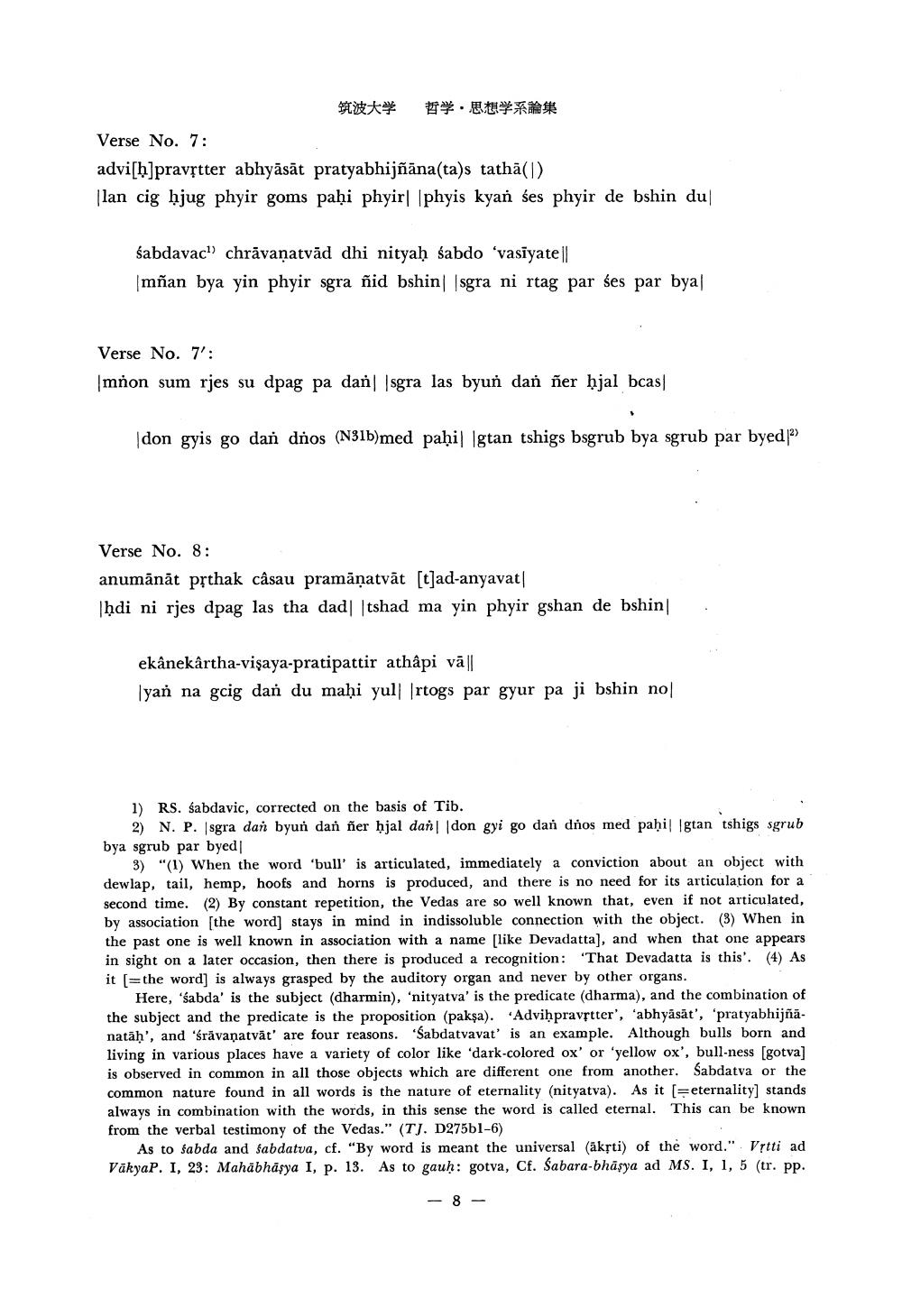Book Title: Mimansa Chapter Of Bhavyas Madhyamaka Hrdaya Karika Author(s): Shinjo Kawasaki Publisher: Shinjo Kawasaki View full book textPage 8
________________ 筑波大学 哲学・思想学系論集 Verse No. 7: advi[h]pravṛtter abhyāsāt pratyabhijñāna (ta)s tatha() lan cig hjug phyir goms pahi phyir| |phyis kyań śes phyir de bshin du śabdavac" chrāvaṇatvād dhi nityaḥ śabdo 'vasiyate|| mñan bya yin phyir sgra ñid bshin| |sgra ni rtag par ses par bya| Verse No. 7': mnon sum rjes su dpag pa dan| |sgra las byun dan ñer hjal bcas don gyis go dan dños (N31b)med paḥi gtan tshigs bsgrub bya sgrub par byed|2 Verse No. 8: anumānāt prthak câsau pramāṇatvāt [t]ad-anyavat ḥdi ni rjes dpag las tha dad| |tshad ma yin phyir gshan de bshin ekânekârtha-vişaya-pratipattir athâpi vā|| yan na gcig dan du mahi yul| |rtogs par gyur pa ji bshin no 1) RS. śabdavic, corrected on the basis of Tib. 2) N. P. sgra dan byun dañ ñer hjal dan don gyi go daň dños med paḥi gtan tshigs sgrub bya sgrub par byed] 3) "(1) When the word 'bull' is articulated, immediately a conviction about an object with dewlap, tail, hemp, hoofs and horns is produced, and there is no need for its articulation for a second time. (2) By constant repetition, the Vedas are so well known that, even if not articulated, by association [the word] stays in mind in indissoluble connection with the object. (3) When in the past one is well known in association with a name [like Devadatta], and when that one appears in sight on a later occasion, then there is produced a recognition: 'That Devadatta is this'. (4) As it [the word] is always grasped by the auditory organ and never by other organs. Here, 'sabda' is the subject (dharmin), 'nityatva' is the predicate (dharma), and the combination of the subject and the predicate is the proposition (paksa). 'Adviḥpravṛtter', 'abhyāsāt', 'pratyabhijñānatāḥ', and 'śrāvaṇatvāt' are four reasons. Sabdatvavat' is an example. Although bulls born and living in various places have a variety of color like 'dark-colored ox' or 'yellow ox', bull-ness [gotva] is observed in common in all those objects which are different one from another. Sabdatva or the common nature found in all words is the nature of eternality (nityatva). As it [=eternality] stands always in combination with the words, in this sense the word is called eternal. This can be known from the verbal testimony of the Vedas." (TJ. D275b1-6) As to sabda and sabdatva, cf. "By word is meant the universal (äkṛti) of the word." Vrtti ad VakyaP. I, 23: Mahabhäşya I, p. 13. As to gauḥ: gotva, Cf. Sabara-bhasya ad MS. I, 1, 5 (tr. pp. -8Page Navigation
1 ... 6 7 8 9 10 11 12 13 14 15 16 17 18 19
